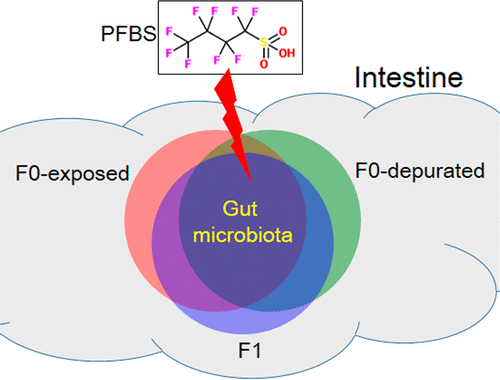当前位置:
X-MOL 学术
›
Environ. Sci. Technol. Lett.
›
论文详情
Our official English website, www.x-mol.net, welcomes your
feedback! (Note: you will need to create a separate account there.)
Perfluorobutanesulfonate Exposure Causes Durable and Transgenerational Dysbiosis of Gut Microbiota in Marine Medaka
Environmental Science & Technology Letters ( IF 8.9 ) Pub Date : 2018-11-19 , DOI: 10.1021/acs.estlett.8b00597 Lianguo Chen 1 , James C. W. Lam 2, 3 , Chenyan Hu 4 , Mirabelle M. P. Tsui 2 , Qi Wang 2 , John P. Giesy 5 , Paul K. S. Lam 2
Environmental Science & Technology Letters ( IF 8.9 ) Pub Date : 2018-11-19 , DOI: 10.1021/acs.estlett.8b00597 Lianguo Chen 1 , James C. W. Lam 2, 3 , Chenyan Hu 4 , Mirabelle M. P. Tsui 2 , Qi Wang 2 , John P. Giesy 5 , Paul K. S. Lam 2
Affiliation

|
Environmental pollutants are known as disruptors of gut microbiota. However, it remains unexplored whether the dysbiosis of gut microbiota by pollutants is durable and transgenerational in teleost. Therefore, this study exposed eggs of marine medaka to environmentally realistic concentrations (0, 1.0, 2.9, or 9.5 μg/L) of perfluorobutanesulfonate (PFBS), a persistent organic pollutant of emerging concern, until sexual maturity. A proportion of F0 adults was dissected after exposure (F0-exposed). Remaining fish were depurated in clean seawater (F0-depurated). F1 offspring were also cultured in clean seawater for a complete life-cycle. Substantial amounts of PFBS were accumulated in F0-exposed intestines, while F1 intestines contained no PFBS. Significant alterations were observed in physiological activities of F0-exposed and F1 medaka. The gut microbial community in F0-exposed, F0-depurated, and F1 medaka were restructured in a concentration-dependent manner by PFBS exposure. Dysbiosis of gut microbiota caused by PFBS exposure was durable in parents and persisted in the offspring. Significant positive correlations were constructed for the genus Cetobacterium with host intestinal epithelial permeability and production of endotoxin lipopolysaccharides. Overall, this study provided the first insight into durable and transgenerational dysbiosis of gut microbiota and intestinal health by PFBS, highlighting the particular susceptibility of gut to xenobiotic stresses.
中文翻译:

全氟丁烷磺酸盐暴露导致海洋Medaka肠道菌群的持久性和世代共生性生物病。
环境污染物被称为肠道菌群的破坏者。然而,由肠道污染物引起的肠道菌群失调是否能持久并在硬骨鱼类中进行世代传承尚待探索。因此,本研究将海洋的卵暴露于环境现实浓度(0、1.0、2.9或9.5μg/ L)的全氟丁烷磺酸盐(PFBS)(一种持续引起关注的持久性有机污染物),直至性成熟。暴露后(F0暴露)解剖一部分F0成人。剩余的鱼在干净的海水中净化(F0净化)。F1后代也要在干净的海水中培养,以维持整个生命周期。在暴露于F0的肠中积累了大量的PFBS,而F1肠则不含PFBS。暴露于F0和F1 medaka的生理活性发生了显着变化。暴露于F0,经F0净化和F1 medaka的肠道微生物群落通过PFBS暴露以浓度依赖的方式进行重组。PFBS暴露引起的肠道菌群失调在父母中是持久的,并在后代中持续存在。为该属建立了显着的正相关具有宿主肠上皮通透性的cetobacter和内毒素脂多糖的产生。总体而言,这项研究通过PFBS对肠道菌群的持久性和世代性营养不良以及肠道健康提供了第一个见解,突出了肠道对异种生物胁迫的特殊敏感性。
更新日期:2018-11-20
中文翻译:

全氟丁烷磺酸盐暴露导致海洋Medaka肠道菌群的持久性和世代共生性生物病。
环境污染物被称为肠道菌群的破坏者。然而,由肠道污染物引起的肠道菌群失调是否能持久并在硬骨鱼类中进行世代传承尚待探索。因此,本研究将海洋的卵暴露于环境现实浓度(0、1.0、2.9或9.5μg/ L)的全氟丁烷磺酸盐(PFBS)(一种持续引起关注的持久性有机污染物),直至性成熟。暴露后(F0暴露)解剖一部分F0成人。剩余的鱼在干净的海水中净化(F0净化)。F1后代也要在干净的海水中培养,以维持整个生命周期。在暴露于F0的肠中积累了大量的PFBS,而F1肠则不含PFBS。暴露于F0和F1 medaka的生理活性发生了显着变化。暴露于F0,经F0净化和F1 medaka的肠道微生物群落通过PFBS暴露以浓度依赖的方式进行重组。PFBS暴露引起的肠道菌群失调在父母中是持久的,并在后代中持续存在。为该属建立了显着的正相关具有宿主肠上皮通透性的cetobacter和内毒素脂多糖的产生。总体而言,这项研究通过PFBS对肠道菌群的持久性和世代性营养不良以及肠道健康提供了第一个见解,突出了肠道对异种生物胁迫的特殊敏感性。











































 京公网安备 11010802027423号
京公网安备 11010802027423号